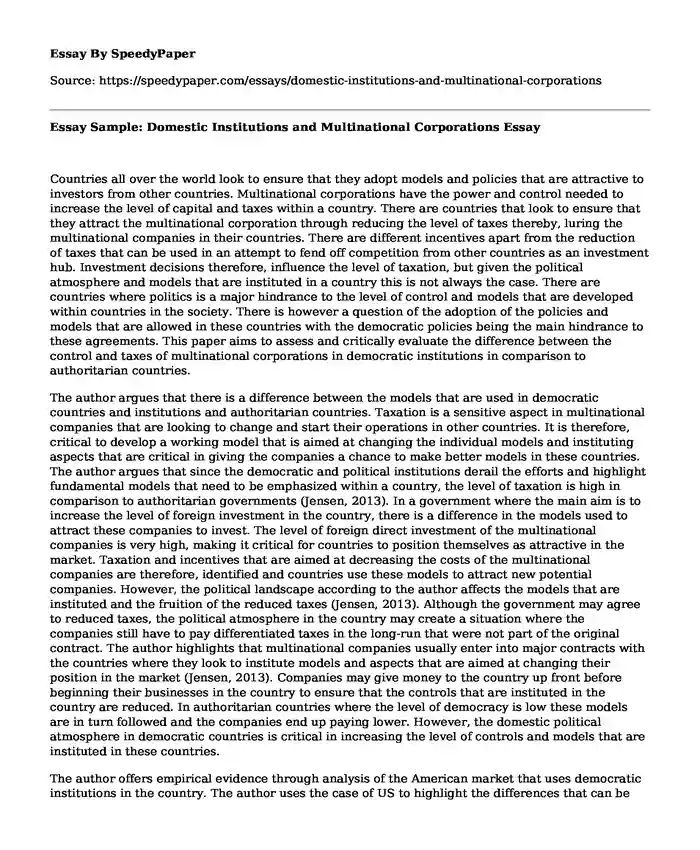Countries all over the world look to ensure that they adopt models and policies that are attractive to investors from other countries. Multinational corporations have the power and control needed to increase the level of capital and taxes within a country. There are countries that look to ensure that they attract the multinational corporation through reducing the level of taxes thereby, luring the multinational companies in their countries. There are different incentives apart from the reduction of taxes that can be used in an attempt to fend off competition from other countries as an investment hub. Investment decisions therefore, influence the level of taxation, but given the political atmosphere and models that are instituted in a country this is not always the case. There are countries where politics is a major hindrance to the level of control and models that are developed within countries in the society. There is however a question of the adoption of the policies and models that are allowed in these countries with the democratic policies being the main hindrance to these agreements. This paper aims to assess and critically evaluate the difference between the control and taxes of multinational corporations in democratic institutions in comparison to authoritarian countries.
The author argues that there is a difference between the models that are used in democratic countries and institutions and authoritarian countries. Taxation is a sensitive aspect in multinational companies that are looking to change and start their operations in other countries. It is therefore, critical to develop a working model that is aimed at changing the individual models and instituting aspects that are critical in giving the companies a chance to make better models in these countries. The author argues that since the democratic and political institutions derail the efforts and highlight fundamental models that need to be emphasized within a country, the level of taxation is high in comparison to authoritarian governments (Jensen, 2013). In a government where the main aim is to increase the level of foreign investment in the country, there is a difference in the models used to attract these companies to invest. The level of foreign direct investment of the multinational companies is very high, making it critical for countries to position themselves as attractive in the market. Taxation and incentives that are aimed at decreasing the costs of the multinational companies are therefore, identified and countries use these models to attract new potential companies. However, the political landscape according to the author affects the models that are instituted and the fruition of the reduced taxes (Jensen, 2013). Although the government may agree to reduced taxes, the political atmosphere in the country may create a situation where the companies still have to pay differentiated taxes in the long-run that were not part of the original contract. The author highlights that multinational companies usually enter into major contracts with the countries where they look to institute models and aspects that are aimed at changing their position in the market (Jensen, 2013). Companies may give money to the country up front before beginning their businesses in the country to ensure that the controls that are instituted in the country are reduced. In authoritarian countries where the level of democracy is low these models are in turn followed and the companies end up paying lower. However, the domestic political atmosphere in democratic countries is critical in increasing the level of controls and models that are instituted in these countries.
The author offers empirical evidence through analysis of the American market that uses democratic institutions in the country. The author uses the case of US to highlight the differences that can be noted from the individual models since there is information on different aspects that can be highlighted in these systems. The author notes that although the countries may not see an increase in the level of regulations, it is the political institutions willingness to ensure that the rules and guidelines stated are followed that make it critical in developing the best models (Jensen, 2013). The empirical data from the taxation models in the US shows that the democratic institutions are a major aspect in determining the level of control and models that are used across different countries in ensuring that companies can transact in these countries.
Multinational Companies have the incentives and power to adjudicate to specific countries on the terms and conditions of their investments. The size of the multinational companies means that they have the power to make ultimatums for countries before they invest. However, from an analysis of the models asserted by the author it is clear that the democratic institutions are powerful in this regard (Oatley, 2005). Companies may have the power and control before they make an investment decision in these countries. However, as the companies invest and the decisions taken are done, it is the level of control and models used in the country that dictates the models of business and level of taxes that is levied hitherto. It is therefore, critical for companies to assess the markets and identify fundamental concepts and models that are critical to the entity before making viable investment decisions.
References
Jensen, N. M. (2013). Domestic Institutions and the Taxing of Multinational Corporations1. International Studies Quarterly, 57(3), 440-448.
Oatley, T. (2005). The Global Economy: Contemporary Debates. Pearson Longman.
Cite this page
Essay Sample: Domestic Institutions and Multinational Corporations. (2019, Sep 13). Retrieved from https://speedypaper.net/essays/domestic-institutions-and-multinational-corporations
Request Removal
If you are the original author of this essay and no longer wish to have it published on the SpeedyPaper website, please click below to request its removal:
- Paper Sample with Current Research in English Language Teaching
- Social Work Essay Example on Working with Addicts
- Essay Example on Designing Modern Transport System Friendly to Pedestrian
- Free Essay Dedicated to the Social Issues in Jamaica
- Cultural Assessment Essay Sample: Ingvar Kamprad Elmtaryd Agunnaryd Company
- Free Essay Sample on Red Tide Solution
- Leadership Development Program - Free Essay Sample
Popular categories





